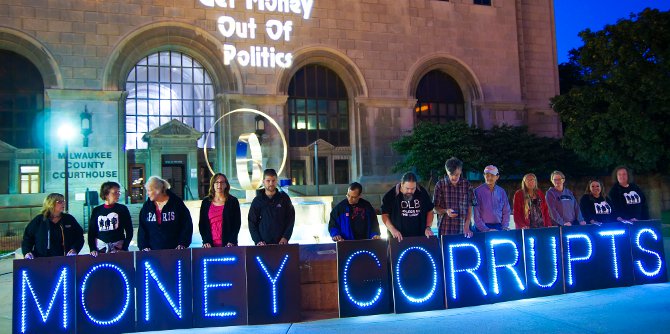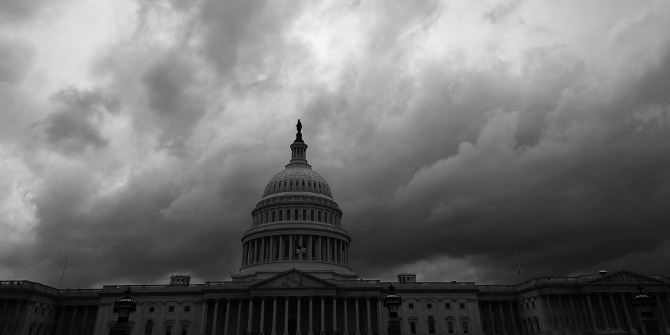 The first primaries and caucuses for the 2024 presidential elections are set for January and February next year. Peter Finn writes that the next six-months until the primaries begin will be far from politically quiet and previews what we can expect, including Iowa’s State Fair and the first Republican debate in August, to gubernatorial elections this November in Kentucky, Louisiana, and Mississippi.
The first primaries and caucuses for the 2024 presidential elections are set for January and February next year. Peter Finn writes that the next six-months until the primaries begin will be far from politically quiet and previews what we can expect, including Iowa’s State Fair and the first Republican debate in August, to gubernatorial elections this November in Kentucky, Louisiana, and Mississippi.
- ‘This article is part of ‘The 2024 Elections’ series curated by Peter Finn (Kingston University). Ahead of the 2024 election, this series is exploring US elections at the state and national level. If you are interested in contributing to the series, contact Peter Finn (finn@kingston.ac.uk).’
There are less than six months until the primaries for the 2024 US presidential elections begin. Starting with the Iowa caucus for Republicans on January 15 2024, and South Carolina on February 3 for the Democratic Party (if one believes the national Democratic Party, or Iowa or New Hampshire if state level parties are correct, see Step 5). Yet rather than a fallow period prior to the primaries starting, the upcoming months will be busy in US political terms. Below I map out five steps between Summer 2023 and the 2024 primaries.
1. Iowa Cultural Markers
The lead up to presidential primary season is full of set pieces that have become markers for those who follow US elections. Given that the Iowa Caucuses have led presidential primaries for both parties in the modern era, nowhere is this truer than in the Hawkeye State. August 10-20 2023 sees the Iowa State Fair in Des Moines; an annual event that every fourth year gets infused with presidential politics (and sometimes even earlier in a presidential cycle). This year is no different, and Republican Governor Kim Reynolds has invited all Republican candidates to ‘Fair Side Chats’ purportedly aimed at going ‘beyond just the issues of a presidential campaign and allow[ing] fairgoers to see who the candidates really are’. Likewise, the Democratic Party is holding a fantastically named ‘Wing Ding‘ event on August 10 in Clear Lake, Iowa. Expect slightly awkward pictures of normally polished politicians eating junk food.
2. First Republican Debate
Hot on the heels of the Iowa State Fair comes the first debate of Republican presidential candidates on August 23. Unlike within the Democratic Party, where Biden appears likely to be the nominee with ease, a whole swathe of candidates have thrown their hat in the ring to be the Republican nominee. Criteria set by the Republican National Committee for candidates to appear at the first debate include gaining ‘1% or higher in at least two qualifying national polls and two qualifying state polls from separate states’, and having received ‘40,000 unique donors, with at least 200 unique contributors from 20 or more states and territories’.
As of late July, CNN analysis suggests that alongside the front runner President Donald Trump, and the pretender to his position Florida Governor Ron DeSantis, will, among others, be joined by Governor of South Carolina Nikki Haley, South Carolina Senator Tim Scott, and former Governor of New Jersey, Chris Christie.

Photo by Phil Scroggs on Unsplash
3. Gubernatorial Elections
As I discussed in a previous piece, in November 2023, there are off year gubernatorial elections scheduled in Kentucky, Louisiana, and Mississippi. Kentucky and Mississippi are first up on November 7. Kentucky Democratic incumbent Governor Andy Beshear will face Republican Daniel Cameron. According to Anne Cizmar of Eastern Kentucky University, those outside of the state should pay attention to the race as ‘The outcome […] may provide clues about key races in the upcoming 2024 elections.’ In Mississippi, meanwhile, incumbent Governor Republican Tate Reeves is running for re-election against Northern District Public Service Commissioner, and former Mayor of the town of Nettleton, Brandon Presley.
Finally, presuming a state (as opposed to a party specific) primary on October 14 does not lead to a winner via a candidate gaining over 50 percent of the vote, then the top two candidates, irrespective of party affiliation, will face each other on November 18 in Louisiana. Current Democratic Governor John Bel Edwards is term limited.
4. Winnowing of a Crowded Republican Field
Along with the candidates mentioned above, those Republicans currently running to be the presidential nominee include former Vice President under Trump Mike Pence, Arkansas Governor Asa Hutchinson, and North Dakota Governor Doug Burgum. Such a large field is clearly not sustainable (and one imagines quite a few candidates, though they would never admit it, are not really running for president), and one presumes that as qualification criteria for debates start to see candidates not making the cut, some will start to euphemistically ‘suspend’, rather than the more accurate ‘end’, their campaigns. As such, by the time of the Republican Caucus in Iowa in January, the field, though perhaps subject to discussions of candidate surges along the way, should be much streamlined and, bar anything unexpected, dominated by a legally troubled Trump, with DeSantis hoping to be snapping at his heels.
5. Democrats Primarily in a Muddle
The national Democratic Party wishes to alter the party’s primary calendar to lessen the influence of Iowa (which holds a caucus) and New Hampshire (which holds a primary), the two traditional first states in the modern primary system. According to the national party, in 2024 the early Democratic Primary states will be South Carolina (February 3), New Hampshire and Nevada (February 6), Georgia (February 13), and Michigan (February 27), with sanctions threatened for states that do not conform to this timetable. Yet, as AP reporting aptly summarises, ‘New Hampshire responded by pointing to its state law mandating that it hold the nation’s first presidential primary — which Iowa only circumvented for five decades because it held a caucus’. The Iowa Democratic Party, meanwhile, in an attempt to maintain its first in the nation caucus status, has proposed to hold an early caucus but withhold the results until other states have voted. What will transpire is, as of July 2023, hard to predict. However, given Biden will, bar something unexpected, be the nominee, these proposed changes will likely be of more interest for the 2028 election than 2024 in terms of presidential nominating procedures.
- Please read our comments policy before commenting.
- Note: This article gives the views of the author, and not the position of USAPP – American Politics and Policy, nor the London School of Economics.
- Shortened URL for this post: https://bit.ly/3q50ISV






